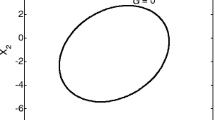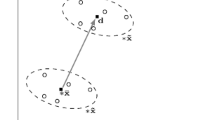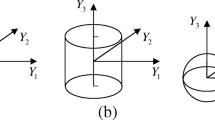Abstract
In most of the reliability-based design optimization (RBDO) researches, accurate input statistical model has been assumed to concentrate on the variability of random variables; however, only a limited number of data are available to quantify the input statistical model in many practical engineering applications. In other words, irreducible variability and uncertainty due to lack of knowledge exist simultaneously in random design variables, which may result in uncertainty of reliability. Therefore, the uncertainty induced by insufficient data has to be accounted for RBDO to guarantee the confidence of reliability. Using the Bayesian approach, the uncertainty of input distributions is successfully propagated to a cumulative distribution function (CDF) of reliability under reasonable assumptions, but it requires a number of function evaluations in double-loop Monte Carlo simulation (MCS). To tackle this challenge, the reliability measure approach (RMA) in confidence-based design optimization (CBDO) is proposed to handle the uncertainty of reliability following the idea of performance measure approach (PMA) in RBDO. Input distribution parameters are transformed to random variables following the standard normal distribution for the most probable point (MPP) search based on the proposed stochastic sensitivity analysis of reliability. Therefore, the reliability is approximated at MPP with respect to input distribution parameters. The proposed CBDO can treat confidence constraints employing the reliability value at the target confidence level that is approximated by MPP in standard normal space. In conclusion, CBDO can be performed in a probabilistic space of input distribution parameters corresponding to the conventional U-space in RBDO to yield the probability (confidence) that reliability is larger than the target reliability. The proposed method can significantly reduce the number of function evaluations by eliminating outer-loop MCS while maintaining acceptable accuracy. Numerical examples are used to demonstrate the effectiveness of the developed sensitivity analysis and RMA to estimate the confidence of reliability in CBDO.





Similar content being viewed by others
References
Bae S, Kim NH, Park C, Kim Z (2017) Confidence interval of Bayesian network and global sensitivity analysis. AIAA J:3916–3924
Bae S, Kim NH, Jang SG (2018) Reliability-based design optimization under sampling uncertainty: shifting design versus shaping uncertainty. Struct Multidiscip Optim 57(5):1845–1855
Cho H, Choi KK, Gaul NJ, Lee I, Lamb D, Gorsich D (2016a) Conservative reliability-based design optimization method with insufficient input data. Struct Multidiscip Optim 54(6):1609–1630
Cho H, Choi KK, Lee I, Lamb D (2016b) Design sensitivity method for sampling-based RBDO with varying standard deviation. J Mech Des 138(1):011405
Cho H, Choi KK, Lamb D (2017) Sensitivity developments for RBDO with dependent input variable and varying input standard deviation. J Mech Des 139(7):071402
Choi SH, Lee G, Lee I (2018) Adaptive single-loop reliability-based design optimization and post optimization using constraint boundary sampling. J Mech Sci Technol 32(7):3249–3262
Der Kiureghian A, Ditlevsen O (2009) Aleatory or epistemic? Does it matter? Struct Saf 31(2):105–112
Du L, Choi KK, Youn BD (2006a) Inverse possibility analysis method for possibility-based design optimization. AIAA J 44(11):2682–2690
Du L, Choi KK, Youn BD, Gorsich D (2006b) Possibility-based design optimization method for design problems with both statistical and fuzzy input data. J Mech Des 128(4):928–935
Dubourg V, Sudret B, Bourinet JM (2011) Reliability-based design optimization using kriging surrogates and subset simulation. Struct Multidiscip Optim 44(5):673–690
Gelman A, Stern HS, Carlin JB, Dunson DB, Vehtari A, Rubin DB (2013) Bayesian data analysis, 3rd edn. Chapman and Hall/CRC
Gunawan S, Papalambros PY (2006) A Bayesian approach to reliability-based optimization with incomplete information. J Mech Des 128(4):909–918
Hansen BE (2009) Lecture notes on nonparametrics. Lecture notes
Hao P, Wang Y, Liu C, Wang B, Wu H (2017) A novel non-probabilistic reliability-based design optimization algorithm using enhanced chaos control method. Comput Methods Appl Mech Eng 318:572–593
Ito M, Kim NH, Kogiso N (2018) Conservative reliability index for epistemic uncertainty in reliability-based design optimization. Struct Multidiscip Optim 57(5):1919–1935
Jung Y, Cho H, Lee I (2019) MPP-based approximated DRM (ADRM) using simplified bivariate approximation with linear regression. Struct Multidiscip Optim 59(5):1761–1773
Kang YJ, Lim OK, Noh Y (2016) Sequential statistical modeling method for distribution type identification. Struct Multidiscip Optim 54(6):1587–1607
Keshtegar B, Lee I (2016) Relaxed performance measure approach for reliability-based design optimization. Struct Multidiscip Optim 54(6):1439–1454
Lee I, Choi KK, Gorsich D (2010) Sensitivity analyses of FORM-based and DRM-based performance measure approach (PMA) for reliability-based design optimization (RBDO). Int J Numer Methods Eng 82(1):26–46
Lee I, Choi KK, Zhao L (2011a) Sampling-based RBDO using the stochastic sensitivity analysis and dynamic Kriging method. Struct Multidiscip Optim 44(3):299–317
Lee I, Choi KK, Noh Y, Zhao L, Gorsich D (2011b) Sampling-based stochastic sensitivity analysis using score functions for RBDO problems with correlated random variables. J Mech Des 133(2):021003
Lee I, Noh Y, Yoo D (2012) A novel second-order reliability method (SORM) using noncentral or generalized chi-squared distributions. J Mech Des 134(10):100912
Lee I, Choi KK, Noh Y, Lamb D (2013) Comparison study between probabilistic and possibilistic methods for problems under a lack of correlated input statistical information. Struct Multidiscip Optim 47(2):175–189
Li G, Meng Z, Hu H (2015) An adaptive hybrid approach for reliability-based design optimization. Struct Multidiscip Optim 51(5):1051–1065
Liang B, Mahadevan S (2011) Error and uncertainty quantification and sensitivity analysis in mechanics computational models. Int J Uncertain Quantif 1(2)
Meng Z, Li G, Wang BP, Hao P (2015a) A hybrid chaos control approach of the performance measure functions for reliability-based design optimization. Comput Struct 146:32–43
Meng Z, Hao P, Li G, Wang B, Zhang K (2015b) Non-probabilistic reliability-based design optimization of stiffened shells under buckling constraint. Thin-Walled Struct 94:325–333
Moon MY, Choi KK, Cho H, Gaul N, Lamb D, Gorsich D (2017) Reliability-based design optimization using confidence-based model validation for insufficient experimental data. J Mech Des 139(3):031404
Moon MY, Cho H, Choi KK, Gaul N, Lamb D, Gorsich D (2018) Confidence-based reliability assessment considering limited numbers of both input and output test data. Struct Multidiscip Optim 57(5):2027–2043
Muscolino G, Santoro R, Sofi A (2016) Reliability analysis of structures with interval uncertainties under stationary stochastic excitations. Comput Methods Appl Mech Eng 300:47–69
Nannapaneni S, Mahadevan S (2016) Reliability analysis under epistemic uncertainty. Reliab Eng Syst Saf 155:9–20
Noh Y, Choi KK, Lee I, Gorsich D, Lamb D (2011a) Reliability-based design optimization with confidence level under input model uncertainty due to limited test data. Struct Multidiscip Optim 43(4):443–458
Noh Y, Choi KK, Lee I, Gorsich D, Lamb D (2011b) Reliability-based design optimization with confidence level for non-Gaussian distributions using bootstrap method. J Mech Des 133(9):091001
Park JW, Lee I (2018) A study on computational efficiency improvement of novel SORM using the convolution integration. J Mech Des 140(2):024501
Peng X, Li J, Jiang S (2017) Unified uncertainty representation and quantification based on insufficient input data. Struct Multidiscip Optim 56(6):1305–1317
Picheny V, Kim NH, Haftka RT (2010) Application of bootstrap method in conservative estimation of reliability with limited samples. Struct Multidiscip Optim 41(2):205–217
Rahman S, Xu H (2004) A univariate dimension-reduction method for multi-dimensional integration in stochastic mechanics. Probab Eng Mech 19(4):393–408
Rao SS, Cao L (2002) Optimum design of mechanical systems involving interval parameters. J Mech Des 124(3):465–472
Rosenblatt M (1952) Remarks on a multivariate transformation. Ann Math Stat 23(3):470–472
Rubinstein RY, Kroese DP (2016) Simulation and the Monte Carlo method (Vol. 10). John Wiley & Sons
Sankararaman S, Mahadevan S (2011) Likelihood-based representation of epistemic uncertainty due to sparse point data and/or interval data. Reliab Eng Syst Saf 96(7):814–824
Sankararaman S, Mahadevan S (2013a) Distribution type uncertainty due to sparse and imprecise data. Mech Syst Signal Process 37(1–2):182–198
Sankararaman S, Mahadevan S (2013b) Separating the contributions of variability and parameter uncertainty in probability distributions. Reliab Eng Syst Saf 112:187–199
Silverman BW (2018) Density estimation for statistics and data analysis. Routledge
Tu J, Choi KK, Park YH (1999) A new study on reliability-based design optimization. J Mech Des 121(4):557–564
Wang Z, Wang P (2014) A maximum confidence enhancement based sequential sampling scheme for simulation-based design. J Mech Des 136(2):021006
Yang D, Yi P (2009) Chaos control of performance measure approach for evaluation of probabilistic constraints. Struct Multidiscip Optim 38(1):83
Yoo D, Lee I (2014) Sampling-based approach for design optimization in the presence of interval variables. Struct Multidiscip Optim 49(2):253–266
Youn BD, Wang P (2008) Bayesian reliability-based design optimization using eigenvector dimension reduction (EDR) method. Struct Multidiscip Optim 36(2):107–123
Youn BD, Choi KK, Park YH (2003) Hybrid analysis method for reliability-based design optimization. J Mech Des 125(2):221–232
Youn BD, Choi KK, Yang RJ, Gu L (2004) Reliability-based design optimization for crashworthiness of vehicle side impact. Struct Multidiscip Optim 26(3–4):272–283
Youn BD, Choi KK, Du L (2005) Enriched performance measure approach for reliability-based design optimization. AIAA J 43(4):874–884
Zhao L, Choi KK, Lee I, Gorsich D (2013) Conservative surrogate model using weighted Kriging variance for sampling-based RBDO. J Mech Des 135(9):091003
Funding
This research was supported by the development of thermoelectric power generation system and business model utilizing non-use heat of industry funded by the Korea Institute of Energy Technology Evaluation and Planning (KETEP) and the Ministry of Trade Industry & Energy (MOTIE) of the Republic of Korea (No. 20172010000830).
Author information
Authors and Affiliations
Corresponding author
Ethics declarations
Conflict of interest
The authors declare that they have no conflict of interest.
Additional information
Responsible Editor: Nam Ho Kim
Rights and permissions
About this article
Cite this article
Jung, Y., Cho, H. & Lee, I. Reliability measure approach for confidence-based design optimization under insufficient input data. Struct Multidisc Optim 60, 1967–1982 (2019). https://doi.org/10.1007/s00158-019-02299-3
Received:
Revised:
Accepted:
Published:
Issue Date:
DOI: https://doi.org/10.1007/s00158-019-02299-3




